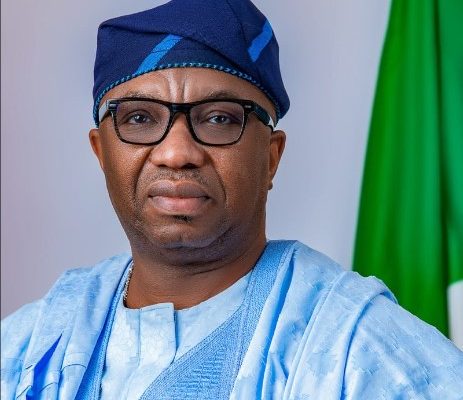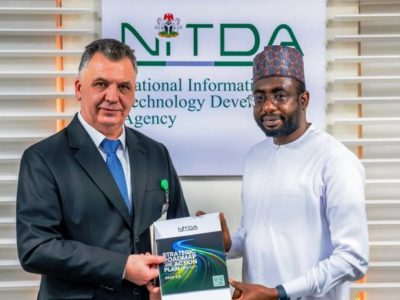Dr. Vincent Olatunji, hitherto the National Commissioner/CEO of the Nigeria Data Protection Bureau (NDPB) is to continue as the National Commissioner/CEO of the newly established Nigeria Data Protection Commission established under the Nigeria Data Protection Bill, 2023 signed into law this week by President Bola Tinubu to become the Nigeria Data Protection Act, 2023.
A transitional clause in the bill transfers all powers, agreements or contracts, actions, offices and officers of the former NDPB to the new Commission thus legitimately affirming the existing offices and actions of the officers in the current dispensation.
RELATED: Breaking! President Tinubu signs Data Protection Bill into law
A person knowledgeable with the matter told IT Edge News.Africa that it is already taken for granted that the Commission already has its key officers led by the National Commissioner, Dr Olatunji, who under the law has a renewable five years tenure.
According to a source in the Presidency: “Mr. President was well briefed on this matter before signing the bill into law. I can tell you that government has confidence in the people in that Commission as presently constituted. Now as a statutory body, they are expected to strengthen the team to become more formidable and align with the mission of this new government to deliver results across all sectors,”
Transitional provisions in the Act
The section in the Act states:
- (1) A reference to the Nigeria Data Protection Bureau (in this clause referred to as “the Bureau”) existing before the commencement of this Bill, or a document issued in the name of the Bureau, shall be read as a reference to the Commission established under this Bill, and all persons engaged by the Commission shall have the same rights, powers and remedies as existed in the Bureau before the commencement of this Bill.
(2) For the purpose of subclause (1) —
(a) a person who, prior to the commencement of this Bill, was an officer, employee or member of staff of the Bureau shall continue in office, and be deemed to have been appointed under this Bill on such terms and conditions not less favourable than that enjoyed prior to the transfer of service;
(b) all existing agreements and contracts currently in effect by the Bureau, as it relates to the provisions of this Bill shall continue;
(c) all records and equipment previously belonging to or allocated for use to the Bureau shall become, on the effective date of this Bill, part of the records and equipment of the Commission;
(d) properties held immediately before the commencement of this Bill on behalf of the Bureau shall on the commencement of this Bill, be vested in the Commission established under this Bill;
(e) any proceeding or cause of action pending or existing immediately before the commencement of this Bill by or against the Bureau, in respect of any right, interest, obligation or liability may be commenced or continued, as the case may be by the Commission; and
(f) all orders, rules, regulations, decisions, directions, licences, authorisations, certificates, consents, approvals, declarations, permits, registrations, rates or other documents that are in effect before the coming into effect of this Bill and that are made or issued by the National Information Technology Development Agency or the Bureau shall continue in effect as if they were made or issued by the Commission until they expire or are repealed, replaced, reassembled or altered.
Vincent Olatunji: Profile of a technocrat
Olatunji, who recently joined the Forbes Technology Council for 2023, an invitation-only community for topnotch CIOs, CTOs, and technology executives, is a PECB Certified Data Protection Officer and a Certified Public Private Partnership Specialist (IP3 Specialist) who holds a doctorate degree in Geography and Planning from the University of Lagos.
With over 30 years of experience in the public sector, Olatunji has brought his wealth of knowledge and professionalism as a technocrat to bear in leading the NDPB now a statutory Commission.
Former acting Director General at the National Information Technology Development Agency (NITDA), Olatunji is an accomplished professional with proven track records of delivering impactful results thereby excelling in building strong relationships across sectors and achieving tangible outcomes. He has also successfully led teams, conducted extensive research, developed effective policies, and implemented strategic initiatives at all levels of government in Nigeria.
Olatunji joined the NITDA in 2002 and has worked in various departments thereby rising to the position of director in 2014 and acting director general in 2016.
Prior to his appointment in February 2022 as the NDPB’s pioneer National Commissioner of NDPB, he worked as the Director of eGovernment Development and Regulations at NITDA where he led a formidable team to deliver various initiatives on Nigeria’s digital transformation.
Since 2022, Olatunji has led his team at the NDPB to chart Nigeria’s pathway in data protection gaining global recognition even as it awaited the legislative nod to become a statutory agency.
Nigeria’s Top 50 Digital Economy Enablers
He has received several awards from both public and private sector organizations including the GNC Digital Hall of Fame Award of Lifetime Recognition for his outstanding contributions to emerging technology for development initiatives in Africa in 2023.
He is recognised as one of Nigeria’s Top 50 Digital Economy Enablers by IT Edge News Africa in February 2023. In April 2018, he was listed among the 100 Leading Telecom and ICT Personalities in Nigeria by the Association of Telecommunication Companies of Nigeria.
In addition, he has received awards from the University of Lagos Alumni Association for Outstanding Commitment and from the Ekiti State University Alumni Association as an Eminent Personality. Furthermore, the Ekiti State University conferred upon him an honorary Doctor of Public Administration degree in June 2018.
Objectives of the new law
Part of the objectives of the Act include
(a) safeguard the fundamental rights and freedoms, and the interests of data subjects, as guaranteed under the Constitution of the Federal Republic of Nigeria, 1999;
(b) provide for the regulation of processing of personal data;
(c) promote data processing practices that safeguard the security of personal data and privacy of data subjects;
(d) ensure that personal data is processed in a fair, lawful and accountable manner;
(e) protect data subjects’ rights, and provide means of recourse and remedies, in the event of the breach of the data subject’s rights;
(f) ensure that data controllers and data processors fulfil their obligations to data subjects;
(g) establish an impartial, independent, and effective regulatory Commission to superintend over data protection and privacy issues, and supervise data controllers and data processors; and
(h) strengthen the legal foundations of the national digital economy and guarantee the participation of Nigeria in the regional and global economies through the beneficial and trusted use of personal data.
Appointment of the National Commissioner for the Commission
According to the Act,
- (1) There shall be for the Commission, a National Commissioner, who shall be —
(a) appointed by the President, on the recommendation of the Minister;
(b) the chief executive and accounting officer of the Commission; and
(c) responsible for the execution of the policies and administration of the affairs of the Commission.
(2) The National Commissioner shall —
(a) hold a certification in data protection from a training body which is duly accredited in line with international best practices; and
(b) possess at least 10 years cognate experience, at a senior management level, in data protection, cybersecurity management, information and communication technology, law, consumer protection, management science, or other relevant disciplines.
(3) A person appointed as the National Commissioner shall not hold any other management position in a Ministry, Department, or Agency of Government, corporation, company, or any other business establishment.
(4) The National Commissioner shall hold office —
(a) for a term of five years, and may be re-appointed for another term of five years, and no more; and
(b) on such other terms and conditions as may be specified in the letter of appointment.
- The National Commissioner shall be the Secretary to the Council, and —
Secretary to the Council
Senate Bill Page 9 of 42
(a) be responsible to the Council;
(b) keep the Council’s records;
(c) conduct the Council’s correspondence; and
(d) discharge such other duties, as the Council may determine.
- The Commission shall, subject to the approval of the Council, recruit directly or by secondment from the Public Service of the Federation, such number of staff, as it deems necessary and expedient —
(a) for the proper and efficient performance of its functions; and
(b) on such terms and conditions, with remunerations, allowances, and benefits.

































